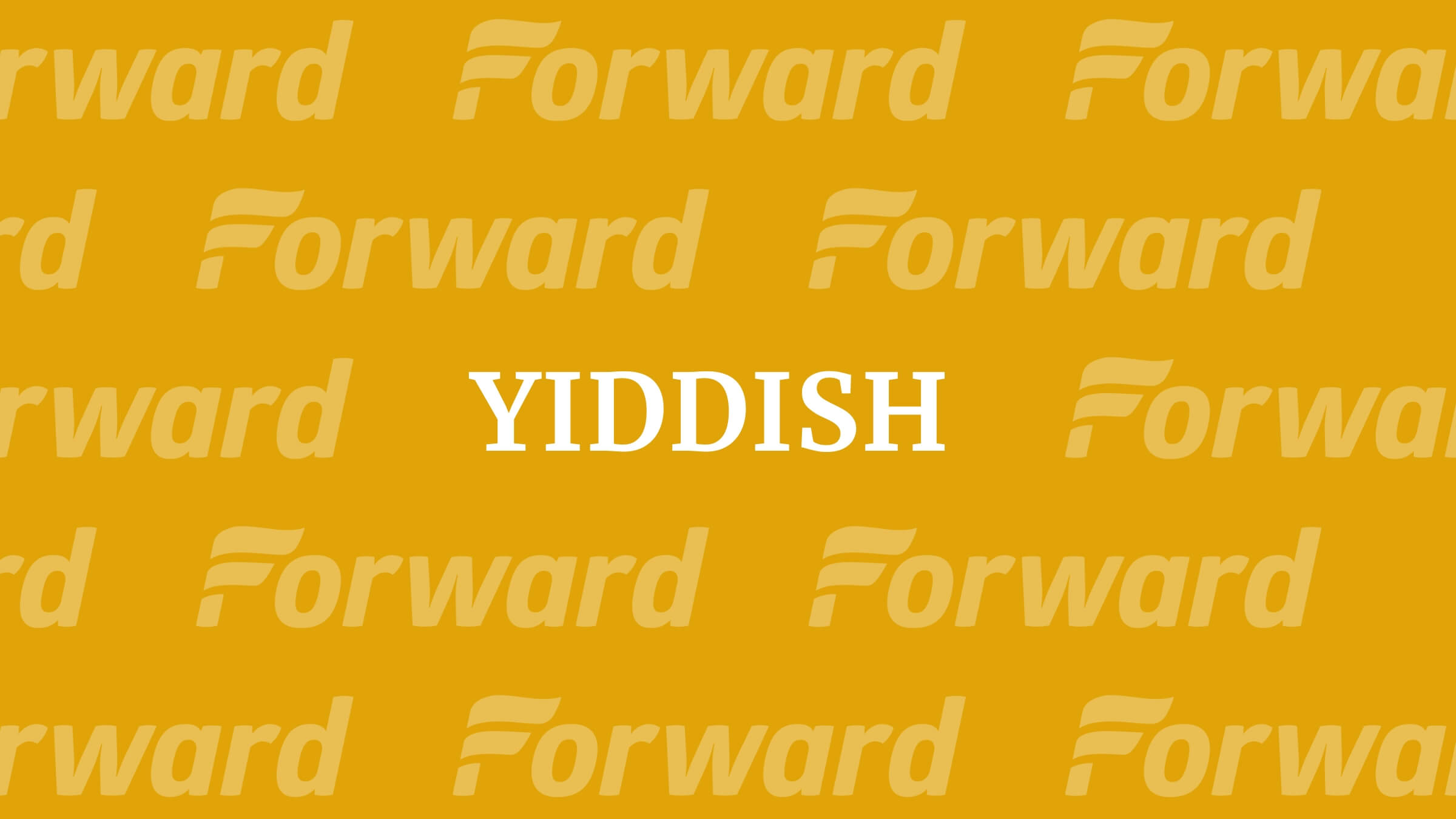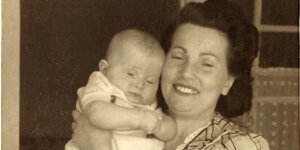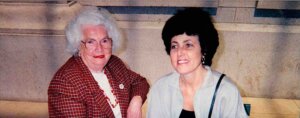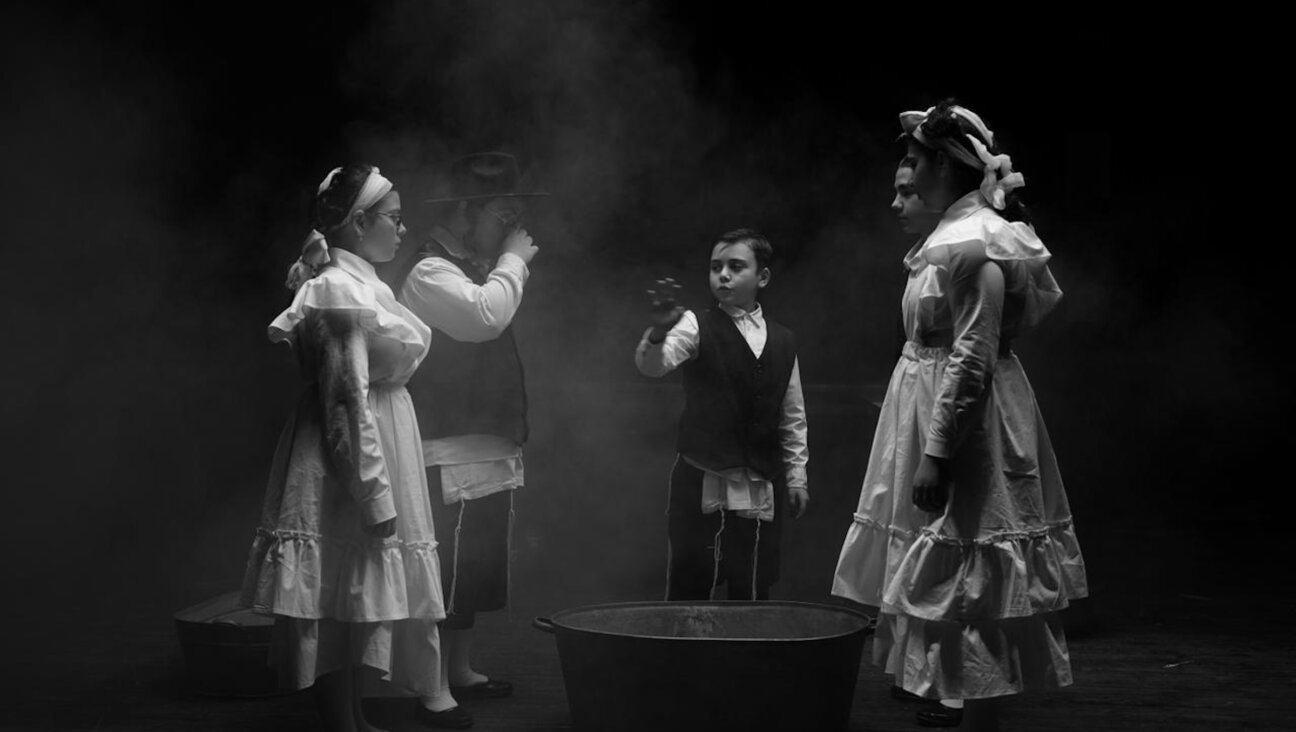The loving, complex relationship I had with my mother, a Holocaust survivor
My mother refused to send me to sleepaway camp, no matter how much I wanted it. For her, ‘camp’ could mean only one thing

Graphic by Angelie Zaslavsky
My mother had been dead three weeks when the angels from hospice urged me to participate in a grieving group. At our first meeting, our leader asked what we missed most about our loved one. When it came time for me to respond, I hesitated. “Her voice,” I said, finally. It was true. My mother’s voice, the way she spoke, in English and in Yiddish, embodied the story of our relationship: often tense, sometimes sweet and always grounded in a difficult, complicated love.

In my childhood, Pola’s voice boomed loud and firm. She ran the household. Her words were spare, but her voice roared and she had the ability to shut down any conversation with a piercing look and a simple “no.”
My parents mostly spoke Yiddish at home, except during heated arguments when they spoke Polish so I wouldn’t understand. Their affection for each other was most visible as they leaned into each other while walking.
Listen to That Jewish News Show, a smart and thoughtful look at the week in Jewish news from the journalists at the Forward, now available on Apple and Spotify:
My father often tried to appease Pola on my behalf. When I asked my mother if I could stay over at a friend’s house or attend a party at the home of a family she didn’t know, my father reassured her. “We know their parents, they’re good people,” he’d say. “It’s important for Hindele to do these things.” My name in the Yiddish variation sealed the deal.
Embarrassed — yet intrigued — by Yiddish
When Pola asked me a question, I responded in English. Yiddish was my first language but I was determined to seal my identity as an amerikaner and was embarrassed that neither of my parents could help me with my homework or advocate for me at school with a full command of the English language. In the safety of our apartment, my mother’s voice would soften when she spoke in her native tongue. And while I dwelled in English, I yearned to become more versed in Yiddish, even as I mispronounced words or got classic curses wrong.
Even in my youth, I knew that a Yiddish curse could wield layered meanings and humor. The ultimate weapon was a variation of “drop dead.” Ver geharget or gey in drerd was simple and easy to master. I learned how to say: “Ale tsuris vos ikh hob oyf mayn harts zoln oysgeyn tsu dayn kop.” (All of the troubles in my heart should go to your head.) There were so many variations on this theme. The troubles could go into your bones or your stomach or your back — for your entire life. Pola would acknowledge my Yiddish slips with a big smile and erupt into laughter. I would fumble just to make her laugh.
The meaning of the word ‘camp’
As calm and agreeable as my mother could be in Yiddish, she also used the language to end a conversation. One spring when I was 11, my three closest friends were preparing for sleepaway camp. I decided to ask my parents if I could go. It was a Sunday evening, the one night we had dinner together as a family before watching Ed Sullivan. I reported that Judy, Louise and Ruth were all going to sleepaway camp. “I would love to go and I have babysitting money to help pay for it,” I said. “It’s only for two weeks.” My father looked down at his napkin. My mother’s face tightened, then she stood up from the chair at the kitchen table and waved her arms. “Du vilst geyn in lager?” (You want to go to camp?)
I winced when I heard lager, realizing that the word “camp” could only mean one thing for my survivor parents. “Vy vould anyone send a child to camp?” Pola asked. They didn’t send me.
Pola’s life was governed by a history she would not discuss. She was not quite 20 years old when the Nazis invaded Poland. Her parents were taken to Treblinka, her sister Chana and Chana’s husband and young son to Auschwitz. They all perished. My mother and her sisters Halinka and Lucia survived the labor camp in Radom and Auschwitz. Mameloshn was the language Pola had grown up with and the deep bond to everything she had lost.
Legally blind but living alone
“Du bist a kind, du veyst gornisht” (You’re such a child, you don’t understand anything), she’d say and silence me. When we did talk, I heard many variations on “no”, especially neyn (no), nit (not) and keyn mol (never). I continued to resist speaking the mother tongue then. It was my parents’ language, not mine.
After my father passed away in 1982, Pola became more stubborn, and her voice hardened. We battled for years over her medical care and safety. She insisted on living alone even after she became legally blind. She once tripped over her shopping cart at the store. Another time, she stumbled while getting her mail and fell on the sidewalk near her apartment building.

Whenever my phone rang, I expected the worst. Yet Pola was certain she could manage on her own. She remained firm in her resistance to any kind of araynmishn zikh (meddling in her affairs), especially from me, the only person who was truly interested in meddling. We had the same conversation every time we spoke:
“Mom, please let me get you more help,” I’d beg.
“Narishkeit (foolishness),” she would say. “You always want to waste money on things that are not necessary. I’ll be fine.”
One hot, early summer afternoon in 2008, I hailed a taxi to the Bronx after trying for hours to reach Pola by phone. I was sweating as I fumbled with the key at the entrance door. “Mom,” I called out, then rushed into the kitchen. There was her regular lunch of farmer’s cheese, sliced tomato and a soft roll, sitting untouched on a plate on the table. The air conditioning was not on and the summer heat was overwhelming.
My strong mother, now helpless
“Mommy, Mommy?” I shouted and ran through the apartment into my old bedroom. Over the course of 40 years, my room had become a vast storage space for “essentials.” Shopping bags lined the interior of the closet and were stacked up against the windowed wall. The shelves were stacked with rolls of toilet paper and paper towels, boxes of tissues, gallon jugs of apple and cranberry juice, canned tuna and salmon, jars of apple sauce, fruit in syrup and gallons of bottled water. This was more than buying in bulk. Pola had survived the Nazis, Auschwitz, extreme hunger and the loss of most of her immediate family. If she was going to live under siege again, she would be prepared.
I spotted her sprawled on the floor near the closet. Her small frame was curled up in the fetal position. One pink slipper rested at the edge of the closet door, the other was still on her left foot. I touched her shoulder and put my finger on her left wrist. My beautiful, strong mother had never looked so helpless and old. She was unconscious, but she had a pulse and was breathing.
‘Don’t let them take me’
I dialed 911, then sat down next to her.
“Zay shtil,” (be still), I whispered. “You’ll be all right.” I held her hand and said we were going to the hospital. She opened her eyes. “Ikh muz do blaybn,” she said. (I have to stay here.) Then she fell silent.
When EMS arrived, she rallied in English so everyone would know she was in charge. “I’m fine,” she said. “It’s nothing.” The three men towering over her thought otherwise and lifted her carefully onto the stretcher. “I’m not going with you,” she announced. Then she turned to me. “Don’t let them take me,” she begged.
Pola spent a week in the hospital, several weeks in rehab and then eight months at the Jewish Home on the Upper West Side. She never forgave me for not allowing her to return home. Every visit began with: “Far vos ken ikh nisht zayn in shtub?” (Why can’t I be at home?) No distraction or explanation could move her.
Making sense of our relationship
Pola passed away on Feb. 9, 2009. We held her funeral on an unusually cold winter day, but light streamed through the trees and the sun warmed us. I found comfort at the gravesite that I had been to so many times before, visiting my father, David. During my eulogy, I tried to make sense of the tension of our relationship.
“I inherited her strength, determination and independence, the very forces that divided us,” I said. I concluded in Yiddish, our shared language, and my default when English could not convey what held us together. “Ikh hob dikh zeyer lib, far ale mol. Ikh vel benken nokh dir.” (I love you very much, for all time. And I will miss you.)
For years after her death, I missed Pola more than I expected and reached for the phone to call her almost every day. Ironically, in the last years before her death, I had dreaded her calls since she would almost always leave the following message:
“You’re never home. It’s your mother, Pola Lerman, call me back! 718-340-9157.”
My return call always started the same way: “Mom, I recognize your voice. Ikh ken dikh.” ( I know you.)
Silence followed. I knew what she was thinking: “Well, if you know me so well, why not call me more often?”
Her voice: A constant companion
During the height of the pandemic, my friend Ellen invited me to join a group of Yiddish speakers she was organizing via Zoom. I had forgotten so much. But it seemed like the perfect opportunity to hear my mother’s voice again. At the start, my Yiddish was clumsy, but the group encouraged me to have geduld or patience, a word I knew well. Pola would often insist: “Ikh hob nisht kein geduld tsu dir!” (I have no patience for you!)
During COVID, it became easy to reclaim Yiddish. I enjoyed saying it was a mekhayeh (a relief) when the 2020 election was called for Joe Biden. The word suggests feeling revived, the way you would feel if you jumped into the ocean on a hot summer day. And I was farklemt (overcome with emotion and almost unable to speak), as people filled the streets cheering and singing.
Classes via Zoom through the Workers Circle (formerly the Workmen’s Circle, where my parents had been members) were more fun than I imagined. My mother’s voice became a constant companion. I could hear her description of a neighbor as a farbissiner (embittered, mean), while she might call another neighbor a zeeskeit (sweetie) or a salesperson a ligner (liar) or a ganif (thief).
The Wednesday Yiddish sessions via Zoom at 5 p.m. have become sacred for me, a farbrengen (in this case, an informal gathering to spend time together, not a religious gathering). After logging in, we all exchange the initial vos makhstu (how are you?). As everyone searches for the words to carry on, laughter follows. Last week, we pondered the merits of latkes (potato pancakes) from a luft fryer (air fryer). I could imagine Pola smiling and mumbling: “Narishkeit!” And then adding in English: “Why not a frying pan?”
My mother is gone 14 years now, but on Wednesday afternoons, she’s speaking to me still.
















